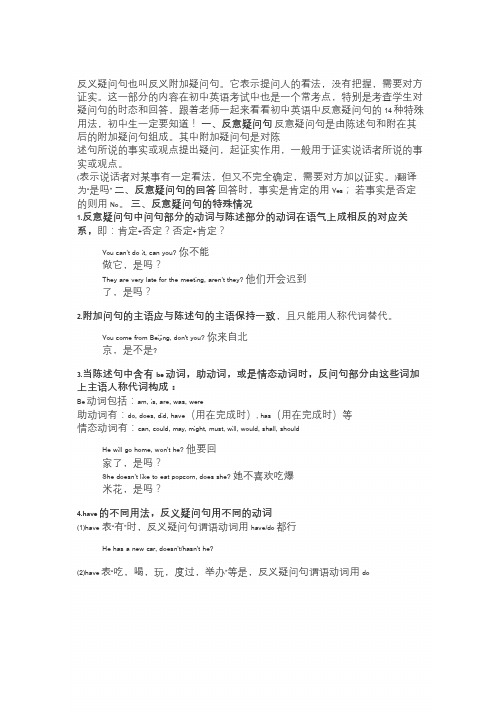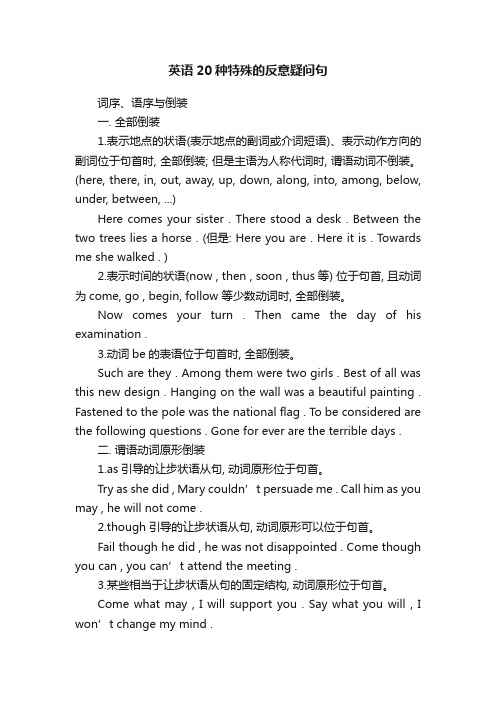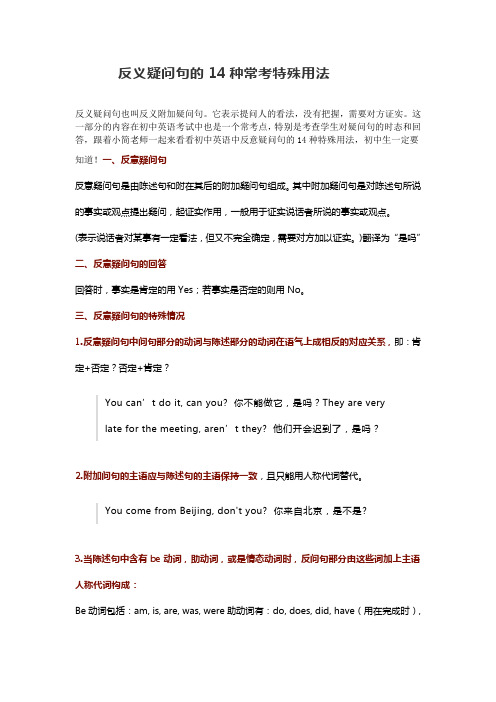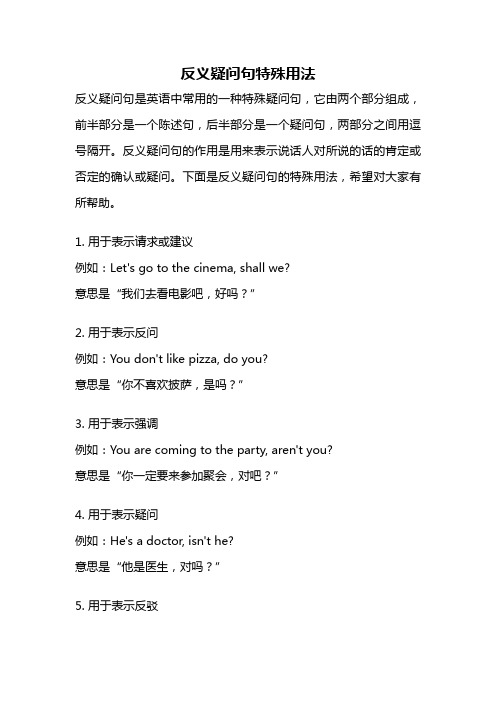反意疑问句的种种特殊情况归纳
九年级复习:反义疑问句的14种常考特殊用法

反义疑问句也叫反义附加疑问句。
它表示提问人的看法,没有把握,需要对方证实。
这一部分的内容在初中英语考试中也是一个常考点,特别是考查学生对疑问句的时态和回答,跟着老师一起来看看初中英语中反意疑问句的14种特殊用法,初中生一定要知道!一、反意疑问句反意疑问句是由陈述句和附在其后的附加疑问句组成。
其中附加疑问句是对陈述句所说的事实或观点提出疑问,起证实作用,一般用于证实说话者所说的事实或观点。
(表示说话者对某事有一定看法,但又不完全确定,需要对方加以证实。
)翻译为“是吗” 二、反意疑问句的回答回答时,事实是肯定的用Yes;若事实是否定的则用No。
三、反意疑问句的特殊情况1.反意疑问句中问句部分的动词与陈述部分的动词在语气上成相反的对应关系,即:肯定+否定?否定+肯定?You can’t do it, can you? 你不能做它,是吗?They are very late for the meeting, aren’t they? 他们开会迟到了,是吗?2.附加问句的主语应与陈述句的主语保持一致,且只能用人称代词替代。
You come from Beijing, don't you? 你来自北京,是不是?3.当陈述句中含有be动词,助动词,或是情态动词时,反问句部分由这些词加上主语人称代词构成:Be动词包括:am, is, are, was, were助动词有:do, does, did, have(用在完成时), has(用在完成时)等情态动词有:can, could, may, might, must, will, would, shall, shouldHe will go home, won’t he? 他要回家了,是吗?She doesn’t like to eat popcorn, does she? 她不喜欢吃爆米花,是吗?4.have的不同用法,反义疑问句用不同的动词(1)have 表“有”时,反义疑问句谓语动词用have/do都行He has a new car, doesn’t/hasn’t he?(2)have表“吃,喝,玩,度过,举办”等是,反义疑问句谓语动词用doHe has supper at home every day, doesn’t he?They had a good time in Beijing, didn’t they?(3)have to表“不得不,必须”时,反义疑问句谓语动词用doKite has to help her mother, doesn’t she?(4)had better表“最好”时,反义疑问句谓语动词用hadWe had better go to school at once, hadn't we?(5)have用在完成时中,反义疑问句谓语动词用haveThey have known the matter, haven’t they?5.(1)反意疑问句的陈述部分带有little, few, never, hardly, seldom,nobody,nothing, no one, none, neither等否定意义的词时,问句部分用肯定式。
英语20种特殊的反意疑问句

英语20种特殊的反意疑问句词序、语序与倒装一. 全部倒装1.表示地点的状语(表示地点的副词或介词短语)、表示动作方向的副词位于句首时, 全部倒装; 但是主语为人称代词时, 谓语动词不倒装。
(here, there, in, out, away, up, down, along, into, among, below, under, between, ...)Here comes your sister . There stood a desk . Between the two trees lies a horse . (但是: Here you are . Here it is . Towards me she walked . )2.表示时间的状语(now , then , soon , thus等) 位于句首, 且动词为come, go , begin, follow 等少数动词时, 全部倒装。
Now comes your turn . Then came the day of his examination .3.动词be的表语位于句首时, 全部倒装。
Such are they . Among them were two girls . Best of all was this new design . Hanging on the wall was a beautiful painting . Fastened to the pole was the national flag . To be considered are the following questions . Gone for ever are the terrible days .二. 谓语动词原形倒装1.as引导的让步状语从句, 动词原形位于句首。
Try as she did , Mary couldn’t persuade me . Call him as you may , he will not come .2.though引导的让步状语从句, 动词原形可以位于句首。
18种特殊反义疑问句

初中英语18种特殊的反意疑问句1.祈使句。
祈使句后一般加上will you或won't you构成反意疑问句,用will you 多表示“请求”,用won't you 多表示提醒对方注意。
例如:Look at the blackboard, will you/ won't you?看黑板,好吗?Let引导的祈使句有两种情况:1)Let's...,后的反意疑问句用shall we或shan't we。
例如:Let's go home, shall we/ shan't we? 回家吧,好吗?还可以用may I来表示征求对方的同意或许可。
2)Let us/me...后的反意疑问句用will you或won't you。
例如:Let me have a try, will you/won't you? 让我试一试,行吗?2.感叹句。
感叹句后加反意疑问句时,其反意疑问句需用be的一般现在时态的否定形式。
例如:What fine weather, isn't it? 多好的天气啊,是吧?3. 当陈述部分谓语动词是need, dare, used to,且这些词被用作实义动词时,其反意疑问句需用do的适当形式。
例如:He needs help, doesn't he?他需要帮助,是吗?4.陈述部分主、谓语是I am...时,反意疑问句用aren't I 或ain't I ,而不是am not I (可用am I not)。
例如:I'm working now, ain't I? 我在工作,是吗?5.陈述部分的主语是everything, nothing, anything或something 时,反意疑问句的主语应用代词it。
例如:Something is wrong with my radio, isn't it? 我的收音机出毛病了,是吧?6.陈述部分的主语是everybody, everyone, anybody, anyone, somebody, someone, nobody, no one, none, neither 时, 其反意疑问句的主语需用复数代词they。
反义疑问句的14种常考特殊用法

反义疑问句的14种常考特殊用法反义疑问句也叫反义附加疑问句。
它表示提问人的看法,没有把握,需要对方证实。
这一部分的内容在初中英语考试中也是一个常考点,特别是考查学生对疑问句的时态和回答,跟着小简老师一起来看看初中英语中反意疑问句的14种特殊用法,初中生一定要知道!一、反意疑问句反意疑问句是由陈述句和附在其后的附加疑问句组成。
其中附加疑问句是对陈述句所说的事实或观点提出疑问,起证实作用,一般用于证实说话者所说的事实或观点。
(表示说话者对某事有一定看法,但又不完全确定,需要对方加以证实。
)翻译为“是吗”二、反意疑问句的回答回答时,事实是肯定的用Yes;若事实是否定的则用No。
三、反意疑问句的特殊情况1.反意疑问句中问句部分的动词与陈述部分的动词在语气上成相反的对应关系,即:肯定+否定?否定+肯定?You can’t do it, can you? 你不能做它,是吗?They are verylate for the meeting, aren’t they? 他们开会迟到了,是吗?2.附加问句的主语应与陈述句的主语保持一致,且只能用人称代词替代。
You come from Beijing, don't you? 你来自北京,是不是?3.当陈述句中含有be动词,助动词,或是情态动词时,反问句部分由这些词加上主语人称代词构成:Be动词包括:am, is, are, was, were助动词有:do, does, did, have(用在完成时),has(用在完成时)等情态动词有:can, could, may, might, must, will, would, shall, shouldHe will go home, won’t he? 他要回家了,是吗?She doesn’tlike to eat popcorn, does she? 她不喜欢吃爆米花,是吗?4.have的不同用法,反义疑问句用不同的动词(1)have 表“有”时,反义疑问句谓语动词用have/do都行He has a new car, doesn’t/hasn’t he?(2)have表“吃,喝,玩,度过,举办”等是,反义疑问句谓语动词用doHe has supper at home every day, doesn’t he?They had agood time in Beijing, didn’t they?(3)have to表“不得不,必须”时,反义疑问句谓语动词用doKite has to help her mother, doesn’t she?(4)had better表“最好”时,反义疑问句谓语动词用hadWe had better go to school at once, hadn't we?(5)have用在完成时中,反义疑问句谓语动词用haveThey have known the matter, haven’t they?5.(1)反意疑问句的陈述部分带有little, few, never, hardly, seldom,nobody, nothing, no one, none, neither等否定意义的词时,问句部分用肯定式。
20种反义疑问句

英语20种特殊的反意疑问句1.祈使句。
祈使句后一般加上will you或won't you构成反意疑问句,用will you 多表示“请求”,用won't you 多表示提醒对方注意。
例如:Look at the blackboard, will you/ won't you?看黑板,好吗?Let引导的祈使句有两种情况:1)Let's...,后的反意疑问句用shall we或shan't we。
例如:Let's go home, shall we/ shan't we? 回家吧,好吗?还可以用may I来表示征求对方的同意或许可。
2)Let us/me...后的反意疑问句用will you或won't you。
例如:Let me have a try, will you/won't you? 让我试一试,行吗?2.感叹句。
感叹句后加反意疑问句时,其反意疑问句需用be的一般现在时态的否定形式。
例如:What fine weather, isn't it? 多好的天气啊,是吧?3. 当陈述部分谓语动词是need, dare, used to,且这些词被用作实义动词时,其反意疑问句需用do的适当形式。
例如:He needs help, doesn't he?他需要帮助,是吗?4.陈述部分主、谓语是I am...时,反意疑问句用aren't I 或ain't I ,而不是am not I (可用am I not)。
例如:I'm working now, ain't I? 我在工作,是吗?5.陈述部分的主语是everything, nothing, anything或something 时,反意疑问句的主语应用代词it。
例如:Something is wrong with my radio, isn't it? 我的收音机出毛病了,是吧?6.陈述部分的主语是 everybody, everyone, anybody, anyone, somebody, someone, nobody, no one, none, neither 时, 其反意疑问句的主语需用复数代词they。
反意疑问句的种种特殊情况归纳

反意疑问句的种种特殊情况归纳反意疑问句的一般构成规则,大家比较熟悉,也较容易掌握,不需赘述。
但是,任何规则都有例外。
一、如果陈述部分是something, anything, nothing, everything等不定代词作句子主语时,疑问部分的主语用“it”代替;如果陈述部分的主语是someone (somebody), anyone (anybody), no one(nobody),everyone (everybody)等不定代词时,疑问部分的主语用“they”代替。
例如:Everything goes very well, doesn’t it?Something is wrong with that TV set, isn’t it?Someone stole my watch, didn’t they?Everyone went to the zoo last Sunday, didn’t they?Nobody is late for school, are they?注:nothing在陈述部分中若做主语时,疑问部分用肯定形式,若做宾语或表语时,疑问部分用肯定形式或否定形式均可。
例如:Nothing happens, does it? (nothing 做主语)The manager knew nothing about that project, did/didn’t he? (nothing做宾语)She is nothing to me, is/isn’t she? (nothing做表语)二、若陈述部分的主语是this, that时,疑问部分的主语用“it”代替;若陈述部分的主是these, those时,则疑问部分的主语用“they”代替。
例如:This is an interesting story, isn’t it?Those are your classmates, aren’t they?三、若陈述部分的主语是动词不定式、动名词及从句时,疑问部分的主语用“it”代替。
[精]初中英语-反义疑问句的14种常考特殊用法
![[精]初中英语-反义疑问句的14种常考特殊用法](https://img.taocdn.com/s3/m/5ccc984889eb172dec63b773.png)
初中英语-反义疑问句的14种常考特殊用法一、反意疑问句反意疑问句是由陈述句和附在其后的附加疑问句组成。
其中附加疑问句是对陈述句所说的事实或观点提出疑问,起证实作用,一般用于证实说话者所说的事实或观点。
(表示说话者对某事有一定看法,但又不完全确定,需要对方加以证实。
)翻译为“是吗”二、反意疑问句的回答回答时,事实是肯定的用Yes;若事实是否定的则用No。
三、反意疑问句的特殊情况1.反意疑问句中问句部分的动词与陈述部分的动词在语气上成相反的对应关系,即:肯定+否定?否定+肯定?You can’t do it, can you?你不能做它,是吗?They are very late for the meeting, aren’t they?他们开会迟到了,是吗?2.附加问句的主语应与陈述句的主语保持一致,且只能用人称代词替代。
You come from Beijing, don't you?你来自北京,是不是?3.当陈述句中含有be动词,助动词,或是情态动词时,反问句部分由这些词加上主语人称代词构成:Be动词包括:am, is, are, was, were助动词有:do, does, did, have(用在完成时), has(用在完成时)等情态动词有:can, could, may, might, must, will, would, shall, shouldHe will go home, won’t he?他要回家了,是吗?She doesn’t like to eat popcorn, does she?她不喜欢吃爆米花,是吗?4.have的不同用法,反义疑问句用不同的动词(1)have 表“有”时,反义疑问句谓语动词用have/do都行He has a new car, doesn’t/hasn’t he?(2)have表“吃,喝,玩,度过,举办”等是,反义疑问句谓语动词用doHe has supper at home every day, doesn’t he?They had a good time in Beijing, didn’t they?(3)have to表“不得不,必须”时,反义疑问句谓语动词用doKite has to help her mother, doesn’t she?(4)had better表“最好”时,反义疑问句谓语动词用hadWe had better go to school at once, hadn't we?(5)have用在完成时中,反义疑问句谓语动词用haveThey have known the matter, haven’t they?5.(1)反意疑问句的陈述部分带有little, few, never, hardly, seldom,nobody, nothing, no one, none, neither等否定意义的词时,问句部分用肯定式。
反义疑问句特殊用法

反义疑问句特殊用法反义疑问句是英语中常用的一种特殊疑问句,它由两个部分组成,前半部分是一个陈述句,后半部分是一个疑问句,两部分之间用逗号隔开。
反义疑问句的作用是用来表示说话人对所说的话的肯定或否定的确认或疑问。
下面是反义疑问句的特殊用法,希望对大家有所帮助。
1. 用于表示请求或建议例如:Let's go to the cinema, shall we?意思是“我们去看电影吧,好吗?”2. 用于表示反问例如:You don't like pizza, do you?意思是“你不喜欢披萨,是吗?”3. 用于表示强调例如:You are coming to the party, aren't you?意思是“你一定要来参加聚会,对吧?”4. 用于表示疑问例如:He's a doctor, isn't he?意思是“他是医生,对吗?”5. 用于表示反驳例如:You think I'm wrong, don't you?意思是“你认为我错了,不是吗?”6. 用于表示感叹例如:It's a beautiful day, isn't it?意思是“今天天气真好,不是吗?”7. 用于表示询问例如:You know how to swim, don't you?意思是“你会游泳,对吗?”8. 用于表示确认例如:You're not going to leave, are you?意思是“你不会离开,对吗?”9. 用于表示反问例如:You wouldn't do that, would you?意思是“你不会那样做,是吗?”10. 用于表示反驳例如:You don't really believe that, do you?。
- 1、下载文档前请自行甄别文档内容的完整性,平台不提供额外的编辑、内容补充、找答案等附加服务。
- 2、"仅部分预览"的文档,不可在线预览部分如存在完整性等问题,可反馈申请退款(可完整预览的文档不适用该条件!)。
- 3、如文档侵犯您的权益,请联系客服反馈,我们会尽快为您处理(人工客服工作时间:9:00-18:30)。
反意疑问句的一般构成规则,大家比较熟悉,也较容易掌握,不需赘述。
但是,任何规则都有例外。
因此,笔者拟将在教学过程中接触到的关于反意疑问句的种种特殊情况归纳如下,以期对广大读者有所帮助。
一、如果陈述部分是something, anything, nothing, everything等不定代词作句子主语时,疑问部分的主语用“it”代替;如果陈述部分的主语是someone (somebody), anyone (anybody), no one(nobody),everyone (everybody)等不定代词时,疑问部分的主语用“they”代替。
例如:Everything goes very well, doesn’t it?Something is wrong with that TV set, isn’t it?Someone stole my watch, didn’t they?Everyone went to the zoo last Sunday, didn’t they?Nobody is late f or school, are they?注:nothing在陈述部分中若做主语时,疑问部分用肯定形式,若做宾语或表语时,疑问部分用肯定形式或否定形式均可。
例如:Nothing happens, does it? (nothing 做主语)The manager knew nothing about that project, did/didn’t he? (nothing做宾语)She is nothing to me, is/isn’t she? (nothing做表语)二、若陈述部分的主语是this, that时,疑问部分的主语用“it”代替;若陈述部分的主是these, those时,则疑问部分的主语用“they”代替。
例如:This is an interesting story, isn’t it?Those are your classmates, aren’t they?三、若陈述部分的主语是动词不定式、动名词及从句时,疑问部分的主语用“it”代替。
例如:To learn English well is very important, isn’t it?Seeing is believing, isn’t it?What we need most now is more money, isn’t it?四、若陈述部分的主语是one时,疑问部分的主语常用“one”代替,偶尔用“you”代替。
例如:One can’t know what will happen in the f uture, can one? /can you?One should learn more knowledge now, shouldn’t one? /shouldn’t you?五、若陈述部分是“There be” 句型结构时,疑问部分的主语用“there”;若“there”是和其他成分构成倒装句型时,疑问部分则根据主语的人称和数的一致原则而定。
例如:There are some f oreign teachers in their school, aren’t there?There will be a f ootball match, won’t there?There goes the bell, doesn’t it?There comes the bus, doesn’t it?There stand/lie several tall buildings at the f oot of the mountain, don’t they?六、若陈述部分是由neither…nor…, either…or…, both…and…, not only…but also…等连词连接的两个名词或代词做句子主语时,疑问部分的主语用复数代词代替。
例如:Both Lucy and Lily came to this party, didn’t they?Not only Kate but also Jane likes dancing, don’t they?Either you or Li Ping is going to the meeting, aren’t you?七、若陈述部分的主语是“the +形容词”表一类人时,疑问部分的主语用代替;若是表某一抽象概念时,疑问部分的主语用“it”代替。
例如:The rich are not always very happy, are they?The young should respect the old, shouldn’t they?The beautif ul isn’t always good, is it?八、有时,陈述部分的主语是单数还是复数,较难判断,判断清楚以后,疑问部分的主语在人称和数方面要与陈述部分的主语保持一致。
例如:One of the policewomen is standing over there, isn’t she?The actress and director decides to sing us a song, doesn’t she?The writer and the teacher will come to give us a talk next week, won’t they?Her brother’s name is Li Ming, isn’t it?九、当陈述部分是由“I’m sure that; I’m af raid that; We are sure that; We are af raid that; I f eel sure that; I hope that; We f eel sure that; It seems that”等句型构成时,因主要意思在从句,故疑问部分的主语要与从句的主语保持一致。
例如:I’m sure that you know him well, don’t you?I’m af raid that he hasn’t f inished that work, has he?I hope you don’t mind my speaking f rankly, do you?It seems that you are an expert, aren’t you?十、若陈述部分以第一人称主语“I/We don’t think (expect, believe, guess, imagine, suppose等+that-cla use”时,反意疑问句要与从句保持一致;若陈述部分是由其他人称代词做主语,反意疑问句则仍与主句保持一致。
例如:I don’t think that she can come, can she?We don’t think that it will rain tomorrow, will it?They don’t think she knew anything about it, do they?He doesn’t suppose that you are a great success, doe s he?Y ou don’t think that I can swim, do you?十一、有时,虽然陈述部分用第一人称代词做句子主语,但反意疑问句的疑问部分是表示征求别人的意见,此时,反意疑问句的疑问部分实际上相当于另一个句子,含义相当于What\How about you?或者What do you think?.注意仔细体会。
例如:I f ind this lesson is too diff icult, don’t you? (=What /How about you?)I believe he is right, don’t you? (=What about you?)I think she is very f riendly to us, don’t you? (= What do you think?)I don’t suppose he will win this game, do you?(=What do you think?)十二、若陈述部分是“ I am…”时,疑问部分用“aren’t I”?若陈述部分是“ I’m not…”时,则疑问部分用“am I?”.例如:I am f oolish, aren’t I?I’m not caref ul enough, am I?十三、若陈述部分为“I/We wish…”时,反意疑问句的疑问部分用“may I/we?”;但若句子主语是第二、三人称代词时,反意疑问句的疑问部分则根据人称代词选择适当的助动词。
例如:I wish to visit the Great Wall, may I?I wish I could f ly to the moon one day, may I?Tom wishes to go abroad, doesn’t he?Y ou wish to make f riends with us, do you?十四、若陈述部分含有否定意义的词如“no, never, seldom, hardly, none, f ew, little, rarely, scarcely, neither, neither…nor…,too…to…”等时,反意疑问句的疑问部分则用肯定形式。
例如:He has never been to Beijing, has he?There is little rain this year, is there?He is too young to look af ter himsel f, is he?She is seldom late f or school, is she?注1:在”too…to…”句型中若用形容词”glad, pleased, ready, eager”等时,不适用这一原则,因为此时并非表示“否定“含义,对于这点要特别注意。
例如:He is too eager to join the army, isn’t he?She is too glad to re ceive a doctor’s degree, isn’t she?注2:若否定含义是通过使用前缀(如:un-, in-, im-, dis-,)和后缀(如-less,)等构成时,其反意疑问句的疑问部分仍用否定形式。
